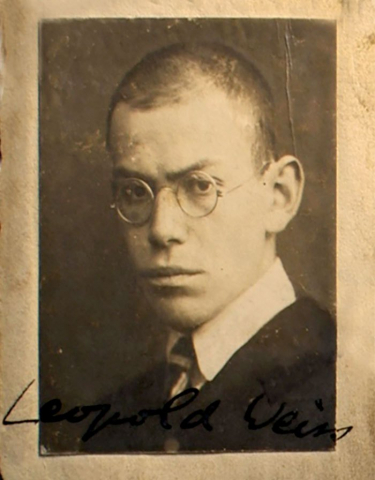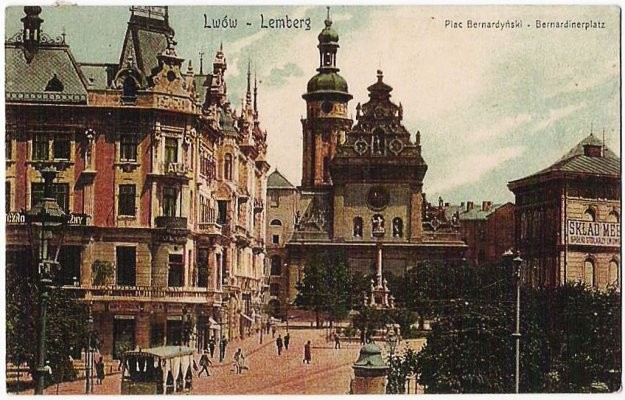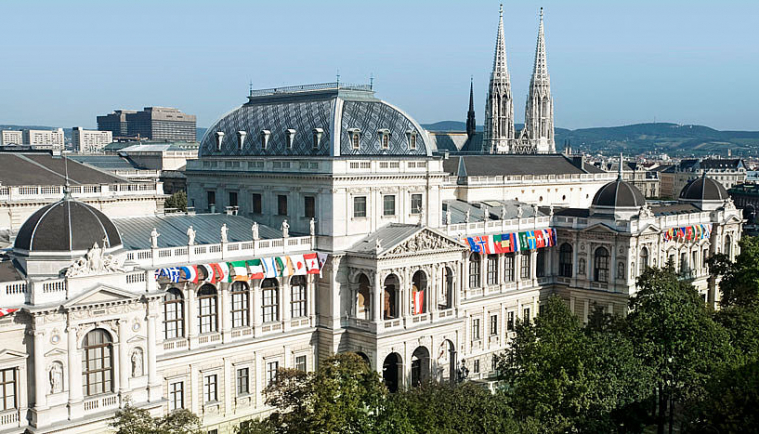At the beginning of the twentieth century, Lviv was a large multinational city in the Austro-Hungarian Empire. German, Polish, Czech and, of course, Ukrainian with its specific Galician accent sounded on its streets and squares. This diversity arose after the Polish-Lithuanian Commonwealth partition in 1772. Galicia became a part of Habsburg monarchy. From the newly acquired territories, the Austrians created an autonomous province loudly called the Kingdom of Galicia and Lodomeria, the capital of which was Lviv, renamed to more German sounded city of Lemberg by the imperial authorities.
During the Austrian rule, Lviv was actively being built and developed. Suffice to say that the half of the buildings, still existing at the historical center, was built in the period from 1772 to 1918. The new authorities reorganized Lviv University, laid a railway truck to the city, and built the station building that still exists. In 1817, one of the largest library and scientific centers of Eastern Europe, Ossolineum, was created here on the basis of private collections. The Habsburg authorities built the opera house and the Galician Seim building, which now adorn the old city.
Before the Austrians’ arrival, Ukrainians and Jews were subjected to a severe discrimination in Lviv. The authorities of the Austro-Hungarian Empire created the conditions for the national and cultural development of Galicia, greatly reducing the discrimination, including religious one. This noticeably contrasted with the neighboring Russian Empire.
At the beginning of the twentieth century, the cathedras of the Roman Catholic, Armenian, and Greek Catholic archbishops, as well as the Orthodox bishop, were located in Lviv. In addition, there were three Jewish communities in the city, including Karaim one. Many citizens of that time spoke three or even four languages. The outstanding Ukrainian writer Ivan Franko, a graduate from Lviv University, wrote his works in four languages.
In this unique city one boy was born in the family of Lviv lawyer Karl Weiss on July 2, 1900. The parents called him Leopold. The Weiss family traditionally practiced Judaism, the religion of the Jewish minority of Galicia and Bukovina. Leopold Weiss’s grandfather was a famous rabbi from Chernivtsi. That is why the boy studied the sacred Judean texts from an early age. However, during these years he was more interested in adventure novels like Fenimore Cooper. Leopold knew Hebrew and Aramaic already in childhood, as well as German and Polish that demonstrated his good linguistic abilities. Subsequently, having become Muhammad Assad, he also learned English, Arabic, Persian and French.
Many years later, he tenderly recalled his childhood spent in far away Galicia: “I am lying on the shore - a little nine or ten years old boy with big dreamy eyes and innocent satisfaction, chewing a grass-blade and looking at the white cows that were grazing nearby. A little way, peasant women are working in the field. One of them is wearing a red headscarf and a blue skirt with wide red stripes. There are willows along the stream banks, and a white duck glides along its surface, leaving traces of sparkling water behind it. And a soft wind tickles my face ...".
Leopold's father often took him in his European trips. Already in his youth, Leo visited many countries, which became a kind of prologue to his future adventures around the world. At the beginning of World War I, riding the wave of general enthusiasm, Leopold Weiss added himself an extra couple of years, and tried to get to the forefront of the war. But his deception was discovered and the boy was returned home. Probably, at the start of the war, the Weiss family moved from Lviv to Vienna. This was due to the fact that the advancing Russian army was rapidly approaching the city. Lviv was captured on September 21, 1914 and until the summer of 1915 it remained under the authority of the Russian Empire.
Already at the very end of the war, Leopold Weiss was finally called up to the military service, but he did not get a chance to fight. The Austro-Hungarian Empire lost the war and came to its end as result of this defeat. On November 1, 1918, the Western Ukrainian People's Republic was proclaimed in Lviv. By this time, the Weiss family had already established solid footing in Vienna. Leopold entered the University of Vienna, where he studied philosophy. The gained knowledge undoubtedly was put in a good use in the future when he worked on his books on Islamic theology.
But at that time the philosophy was not Weiss's main field of interest. He passionately dreamed of becoming a journalist. He was witnessing post-war Europe boiled like one huge cauldron. The Revolutions, taken place in Russia, Germany, Hungary and a number of other countries, destroyed centuries-old European empires. Social experiments found many supporters not only among the workers, but also among the creative intelligentsia.
In this situation, the journalists became the vanguard, which not only covered the events, but was in its epicenter. Weiss began studying journalism. In 1920, despite the protests of his father Leopold became a journalist. He moved to Berlin. A year later, Weiss managed to get a job at the information agency Vereinigte Telegraph. At that time he met Kateryna Peshkova, the wife of the writer Maxim Gorky. She came to Berlin to raise funds to help the starving people in Bolshevik Russia. Peshkova shared significantly important information with Weiss. It was a basis for the article, which made the name Weiss well-known throughout Germany.
At this time, Leopold accepted the job offer as a reporter for one of the leading German newspapers Frankfurter Zeitung, but the East had been already attracting him. Therefore, he did not hesitate when he received an invitation from his uncle Dorian Fengeybaum, the head of a psychiatric clinic in Jerusalem.
It was a time, when Zionist organisations sought to organize a massive resettlement of Jews to Palestine to create the state of Israel there. Jerusalem immediately caught Leopold Weiss’s imagination. He was fascinated not by Zionists’ ideas, but by the Eastern charm, the sounds of azan, the guttural Arabic speech. And most of all he was interested in Islam. Weiss met with Muslims and during the talks tried to understand the religion that was new for him. He intensively studied Arabic, every day more and more approaching the moment of choice, which changed his whole future life.
By Oleksandr Stepanchenko




